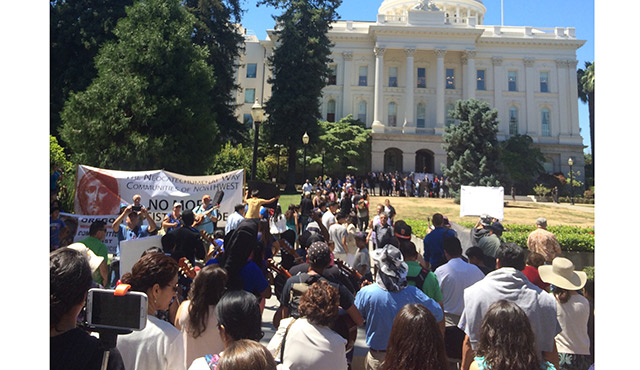A controversial bill that would legalize physician-assisted suicide in California was removed from a scheduled hearing of the State Assembly’s Health Committee July 7 and its authors said they would not try to reintroduce the bill for the remainder of 2015.
Senate Bill 128, which would allow doctors to prescribe lethal doses of drugs to terminally ill patients, was passed by the State Senate in June but, in the face of determined opposition by a large coalition of medical, religious and disability rights groups, support for the bill wilted to the point where only four of the 19 Health Committee members said they would support it, according to a poll taken by the Sacramento Bee.
The bill, which is modeled after a bill adopted in Oregon in 1997, gained traction after Brittany Maynard, a 29-year-old California woman suffering from brain cancer, moved to Oregon last year so that she could end her own life through legal physician-assisted suicide.
Proponents of the bill have said they may try to reintroduce the measure next year and, if it fails to be approved by the Legislature, an option would be to place it on the ballot as an initiative.
The bill’s most recent setback came as a result of longstanding and continuous opposition by a coalition of groups organized under the umbrella of the advocacy group Californians Against Assisted Suicide (CAAS), said its spokesperson Tim Rosales.
“This is a broad coalition,” said Rosales, “and very diverse. There are groups that are on every end of the ideological spectrum: those who would identify themselves as pro-choice or pro-life, or those who would identify themselves as agnostic on that particular issue. But one unique thing about the coalition is that many of the groups don’t agree on much of anything else except assisted suicide, and to get them to work collaboratively is a real achievement and something that they certainly deserve a lot of credit for.”
Rosales pointed to the effective efforts of three primary categories of coalition members in persuading legislators not to support the bill. He called the various disability rights advocacy groups “unsung heroes” who had been “tireless in some of their advocacy.” The “tremendous networks” of the faith-based members of the coalition also proved instrumental, as did “the oncologists and their trade association here in California. They’re the doctors closest to this issue and they’re the ones who will deal with this if it becomes legal, more than any other medical specialty. They testified at every hearing and were advocating strongly from their membership against this legislation.”
The future of the bill, said Rosales, is likely murky.
“I think this was a setback for [the proponents],” he said. “and I honestly think they don’t know what to do right now. There’s probably a variety of opinions in their camp. For our part, we’re continuing to come prepared and to communicate with legislators and voters about what we feel is wrong not just with the bill itself, but with the issue.

